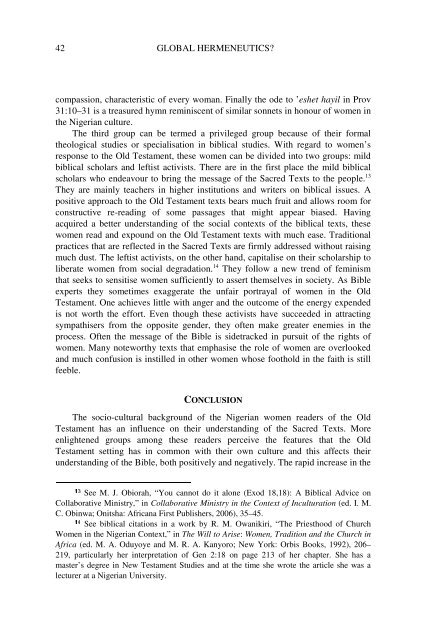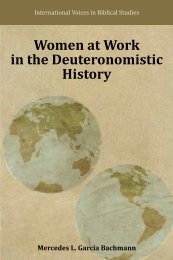Global Hermeneutics? - International Voices in Biblical Studies ...
Global Hermeneutics? - International Voices in Biblical Studies ...
Global Hermeneutics? - International Voices in Biblical Studies ...
You also want an ePaper? Increase the reach of your titles
YUMPU automatically turns print PDFs into web optimized ePapers that Google loves.
42 GLOBAL HERMENEUTICS?<br />
compassion, characteristic of every woman. F<strong>in</strong>ally the ode to ’eshet hayil <strong>in</strong> Prov<br />
31:10–31 is a treasured hymn rem<strong>in</strong>iscent of similar sonnets <strong>in</strong> honour of women <strong>in</strong><br />
the Nigerian culture.<br />
The third group can be termed a privileged group because of their formal<br />
theological studies or specialisation <strong>in</strong> biblical studies. With regard to women’s<br />
response to the Old Testament, these women can be divided <strong>in</strong>to two groups: mild<br />
biblical scholars and leftist activists. There are <strong>in</strong> the first place the mild biblical<br />
scholars who endeavour to br<strong>in</strong>g the message of the Sacred Texts to the people. 13<br />
They are ma<strong>in</strong>ly teachers <strong>in</strong> higher <strong>in</strong>stitutions and writers on biblical issues. A<br />
positive approach to the Old Testament texts bears much fruit and allows room for<br />
constructive re-read<strong>in</strong>g of some passages that might appear biased. Hav<strong>in</strong>g<br />
acquired a better understand<strong>in</strong>g of the social contexts of the biblical texts, these<br />
women read and expound on the Old Testament texts with much ease. Traditional<br />
practices that are reflected <strong>in</strong> the Sacred Texts are firmly addressed without rais<strong>in</strong>g<br />
much dust. The leftist activists, on the other hand, capitalise on their scholarship to<br />
liberate women from social degradation. 14 They follow a new trend of fem<strong>in</strong>ism<br />
that seeks to sensitise women sufficiently to assert themselves <strong>in</strong> society. As Bible<br />
experts they sometimes exaggerate the unfair portrayal of women <strong>in</strong> the Old<br />
Testament. One achieves little with anger and the outcome of the energy expended<br />
is not worth the effort. Even though these activists have succeeded <strong>in</strong> attract<strong>in</strong>g<br />
sympathisers from the opposite gender, they often make greater enemies <strong>in</strong> the<br />
process. Often the message of the Bible is sidetracked <strong>in</strong> pursuit of the rights of<br />
women. Many noteworthy texts that emphasise the role of women are overlooked<br />
and much confusion is <strong>in</strong>stilled <strong>in</strong> other women whose foothold <strong>in</strong> the faith is still<br />
feeble.<br />
CONCLUSION<br />
The socio-cultural background of the Nigerian women readers of the Old<br />
Testament has an <strong>in</strong>fluence on their understand<strong>in</strong>g of the Sacred Texts. More<br />
enlightened groups among these readers perceive the features that the Old<br />
Testament sett<strong>in</strong>g has <strong>in</strong> common with their own culture and this affects their<br />
understand<strong>in</strong>g of the Bible, both positively and negatively. The rapid <strong>in</strong>crease <strong>in</strong> the<br />
¨¡See M. J. Obiorah, “You cannot do it alone (Exod 18,18): A <strong>Biblical</strong> Advice on<br />
Collaborative M<strong>in</strong>istry,” <strong>in</strong> Collaborative M<strong>in</strong>istry <strong>in</strong> the Context of Inculturation (ed. I. M.<br />
C. Ob<strong>in</strong>wa; Onitsha: Africana First Publishers, 2006), 35–45.<br />
¨¢See biblical citations <strong>in</strong> a work by R. M. Owanikiri, “The Priesthood of Church<br />
Women <strong>in</strong> the Nigerian Context,” <strong>in</strong> The Will to Arise: Women, Tradition and the Church <strong>in</strong><br />
Africa (ed. M. A. Oduyoye and M. R. A. Kanyoro; New York: Orbis Books, 1992), 206–<br />
219, particularly her <strong>in</strong>terpretation of Gen 2:18 on page 213 of her chapter. She has a<br />
master’s degree <strong>in</strong> New Testament <strong>Studies</strong> and at the time she wrote the article she was a<br />
lecturer at a Nigerian University.




